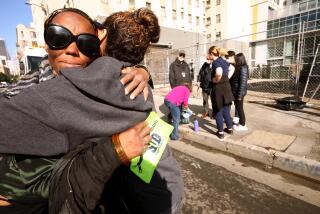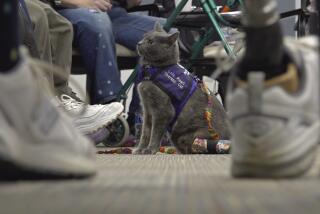Sympathetic Ear Can Be a Balm to Patients : Health: Volunteers for the Santa Barbara-based Love Yourself Foundation visit hospitals. They are trained to boost morale by listening and talking to the ailing and bedridden.
- Share via
SANTA PAULA — A cantankerous, tattoo-covered biker--laid up in Santa Paula Memorial Hospital with a broken back, encased in a full body cast--was giving the nurses fits before Larry and Judy Dunst decided to pay the young man a visit.
The husband-and-wife team, making their weekly rounds at the hospital to offer bedridden patients a little company, received fair warnings from the nurses: Be careful entering the room; he’s liable to start screaming.
After a gentle rap on the door, the couple poked their heads in and asked the burly 22-year-old man if he cared to have a visitor.
“He said, ‘Sure, come on in,’ ” recalled Judy Dunst. “Larry got on one side of the bed and I got on the other. He just kind of looked at us and started giggling.”
The patient, awaiting surgery for fractured vertebrae he suffered in a motorcycle accident, found humor in the Dunsts’ attire: full Raggedy Ann and Raggedy Andy regalia.
Judy Dunst, 36, sported a light-blue and white heart-patterned pinafore, bright red cheeks and nose and a mop-like wig; Larry Dunst, made up with similar features, wore a jumpsuit of red-and-white checks on top and sky blue on the bottom.
“The costume got us through the door because he was curious,” said Larry Dunst, 50. “But the rest was the training.”
The Fillmore couple are Ventura County’s first participants in the nonprofit Love Yourself Foundation, a flourishing hospital visitation program based in Santa Barbara.
Founded in 1985 by Karen Fox of Santa Barbara, the program’s volunteers are trained to boost the spirits of hospitalized patients by providing moral support via a sympathetic ear. About 300 people have been trained, and there are 70 volunteers in Santa Barbara County, Los Angeles and San Diego, plus three in Hanover, N.H.
“Hospitals are a lonely place,” said Fox, who survived an extended battle with cervical cancer. “Not only do you have to deal with physical pain, but you also have to fight the fear and loneliness. It can be overwhelming at times.”
The Dunsts recently completed the foundation’s requisite four-day training seminar in Santa Barbara, studying, among other topics, Elizabeth Kubler-Ross’ five stages of dying: denial, grief, anger, bargaining and acceptance.
For the past four months, they have spent their Sunday mornings at the small, one-story Santa Paula hospital, deftly employing their listening skills. Sauntering through the halls--with stops in emergency, the intensive care unit and maternity, talking with young and old--the couple greets any patient permitted to have guests. The simple, friendly overture--”Howdy, would ya like a visitor?”--usually gets them through the door.
“It really perks up the adults as well as the kids,” said Dr. Robert Dekkers, a pediatrician at the hospital.
Not all visits are cheerful, said Larry Dunst, a pharmacist who owns Clough’s Pharmacy in Fillmore.
“When you walk into a room and ask, ‘How are you?’--and the person says, ‘I’m going to die soon’--you don’t say: ‘You’re not going to die; everything will be all right,’ ” he said. “Some of these people are not going to get better. They are going to die. You have to deal with that and it’s better to shut up and listen to what they have to say.”
As for the biker, Judy Dunst said: “He really started to open up, talking about the accident and talking about, ‘Boy, I sure would like to get out of here. I’ve been a real pain in the rear to the nurses.’ . . . Except he didn’t use that language.”
More to Read
Sign up for Essential California
The most important California stories and recommendations in your inbox every morning.
You may occasionally receive promotional content from the Los Angeles Times.













